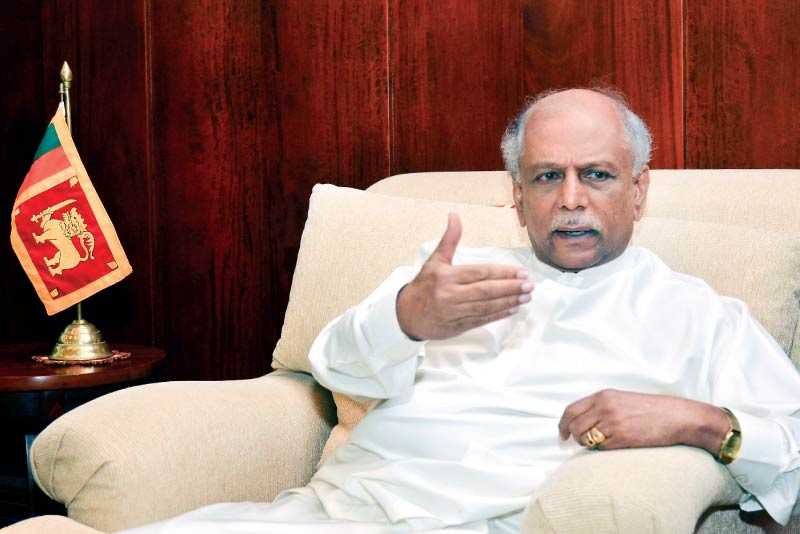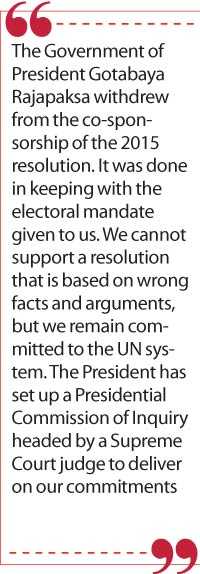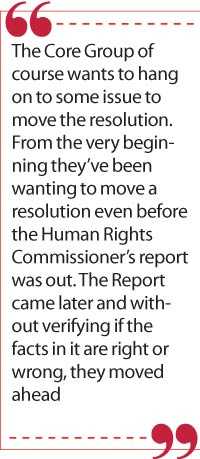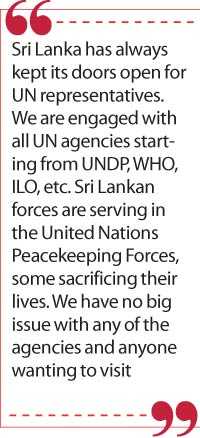Friday Feb 06, 2026
Friday Feb 06, 2026
Monday, 22 March 2021 00:00 - - {{hitsCtrl.values.hits}}

Minister of Foreign Affairs Dinesh Gunawardena - Pic by Daminda Harsha Perera
By Chandani Kirinde
A resolution on promoting reconciliation, accountability and human rights in Sri Lanka is set for a vote at the United Nations Human Rights Council (UNHRC) in Geneva this evening, a move strongly opposed by the Government. Ahead of the vote, Foreign Minister Dinesh Gunawardena spoke to the Daily FT on why the Government thinks the move is political and goes against the principles of the UN body. He also said the resolution fails to recognise progress made by the country over the years and accused Britain, which heads the Core Group sponsoring the resolution, of double standards. Here are excerpts of the interview:
 |
 |
 |
 |
 |
 |
Q: Things are looking tough for Sri Lanka at the UNHRC with another resolution about to be adopted. How does the Government view this?
For many years Sri Lanka has performed well in key areas beyond the international community’s expectations on terrorism, on democratic governance and safeguarding the rights of citizens of our country but resolution after resolution has been brought targeting the country.
After the 9/11 terrorist attacks in the USA, the UN Security Council adopted a resolution with the aim of defeating terrorism at any cost and the right of self-defence against terrorist attacks under the UN Charter. We are the first country that was able to defeat one of the deadliest terrorist organisations in the world, a group which remains proscribed in many countries including those in the Core Group who are sponsoring the resolution on Sri Lanka. These countries should understand the reality of the ground situation without bringing more resolutions for the sake of doing so.
Our Constitution does not allow foreign judges to be appointed or for any inquiries to be held by foreign judges and hence we are working within our Constitution. The Government of President Gotabaya Rajapaksa withdrew from the co-sponsorship of the 2015 resolution, and it was done in keeping with the electoral mandate given to us. We cannot support a resolution that is based on wrong facts and arguments, but we remain committed to the UN system. The President has set up a Presidential Commission of Inquiry headed by a Supreme Court judge to deliver on our commitments. We have also budgeted and given support to the Office of Missing Persons (OMP) and the Office of Reparations.
Q: There seems to be a lack of faith in such Commissions?
The Supreme Court is the highest court in the country, and this is recognised by the Constitution of Sri Lanka. The real problem with those questioning this process is their preoccupation with the election victory of President Gotabaya Rajapaksa and the subsequent parliamentary election victory that brought in a new government. The Resolution refers to day-to-day internal affairs of the country, on appointments made to government departments and ministries. We have rejected this.
Lord Naseby in his address to the House of Lords debunked the figures by quoting from confidential reports that were sent by the British High Commission in Colombo to London. Today the United Kingdom (UK) has adopted double standards where Sri Lanka is concerned. A Bill has been moved in the House of Commons to give legal protection to British service personnel by restricting investigations and prosecutions against them for their actions in combat in other countries. This is the British way of saying that when it comes to us it is one law and when it comes to the rest of the countries of the global south, it is another. We have questioned this.
These are the arguments on which Sri Lanka and friendly countries have stood up and told the Council that you have deviated from the principles and the procedures of the HRC. Sri Lanka’s progress in the last so many years have been totally ignored by the Human Rights Commissioner as well as the Core Group which are moving the resolution which is very clearly a political resolution.
Q: You are saying the sponsors of the resolution have toughened their stance because there was a change in government here and it is targeting the present set of rulers?
It is a political resolution because facts are stubborn. If anyone could come, they can see that our democratic system is moving smoothly, and accepted norms are being upheld. The European Union (EU) monitors themselves said Sri Lanka had a very democratic election. Sri Lanka is one of the oldest parliamentary democracies in Asia and we have exercised universal suffrage for 90 years. We are proud of it. Maybe others are not proud. And we have achieved much for our citizens, whether they be Sinhala, Tamil, or Muslim. We have defeated terrorism which was what was resolved by the UN resolution adopted post 9/11.
Q: Do you feel the Government was too hasty in withdrawing from the 2015 resolution?
The Government had to withdraw from it. Even the last President (Maithripala Sirisena) was not happy with it. The terms of the cosponsored resolution cannot be implemented under the provisions of our Constitution. The Government has offered a way out by appointment of a Supreme Court judge to inquire in full into all these allegations.
Q: The question of double standards comes up often on human rights issues but aren’t there certain things that could have been done differently by the Government which might have given it a better chance at gaining support at the UNHRC? For example, the Government has alienated its traditional allies in Muslim majority nations by its cremation-only policy of COVID-19 dead.
Sri Lanka has been a pioneer and important partner of the Non-Aligned Movement (NAM) and all countries in the group respect Sri Lanka’s decisions. The burial issue has been solved. The early guidelines were revised, and this issue has now been solved. There is no basis on which such an issue can be raised in the HRC. The Core Group of course wants to hang on to some issue to move the resolution. From the very beginning they’ve been wanting to move a resolution even before the Human Rights Commissioner’s report was out. The Report came later and without verifying if the facts in it are right or wrong, they moved ahead.
Today the whole world is engulfed by the COVID-19 pandemic and Sri Lanka has somewhat managed the situation well. What is our call to the Human Rights Commissioner? Today we need vaccinations to protect human lives across the world rather than them trying to harass individual countries with biased resolutions. This is what I stated before Geneva in February.
The world is facing the challenge of delivering the vaccines that countries are requesting. But a few countries on the global north ignore this and get together and pass resolutions against countries of the global south. This has become the pattern that the Human Rights Commission wants to adopt.
Q: When the Government withdrew from the co-sponsorship of the 2015 resolution, you pledged to engage with the UN agencies, procedures, etc.? Will the Government facilitate visits by the Human Rights Chief, Special Rapporteurs, etc.?
Sri Lanka has always kept its doors open for UN representatives. We are engaged with all UN agencies starting from UNDP, WHO, ILO, etc. Sri Lankan forces are serving in the United Nations Peacekeeping Forces, some sacrificing their lives. We have no big issue with any of the agencies and anyone wanting to visit. The President has said, they are always welcome. So many Ambassadors come and go, so many country representatives come and go. It was only during the COVID-19 pandemic, severe travel restrictions had to be imposed. Now we have started the travel bubble for visits by VIPs, anyone can visit. They can come and talk to the people.
We have been one of the most successful countries in the demining, 95% of the lands that were occupied by the security forces have been handed back. Housing and development projects are moving ahead. We have not been discriminatory against the people of the north and east. The HR Commissioner has made a report without knowing the local conditions.
Our economic programs for this year have made budgetary allocations for all institutions that work with the UN agencies. I have approved whatever requests that have come for visits and met with representatives of many UN agencies including those dealing with terrorism, drugs, etc. which go beyond the boundaries of one country. We share confidential information with each other. How can the HRC pass resolutions in this manner on a country or any other country by surpassing its mandate when country specific resolutions are not the principle on which the Human Rights Commission should act.
Q: The resolution will be put to a vote on 22 March, and it is likely to be carried. What has the Government’s plan been to win support to have the resolution defeated?
The President, the Prime Minister, Foreign Ministry officials and our envoys serving in different countries have been explaining our position. The President has had special discussions in addition to meeting ambassadors and explaining the reality of what the country experienced. Perhaps some countries would not like to remember when over 300,000 civilians crossed over from LTTE controlled areas how security forces personnel had to assist them to get to welfare camps. How can they accuse the members of the armed forces without establishing the allegations made against them by some parties? All of them were protected including LTTE cadres who surrendered. Over 13,000 hardcore members were rehabilitated and released.
We had a very unstable government in office the last few years which caused a lot of instability and finally the Easter Sunday attacks took place. We have restored stability with a strong mandate from the people and faced the challenge of COVID-19 and kept the economy moving forward. We have also maintained friendly relations with all countries. We had the visit by Pakistan’s Prime Minister and Foreign Ministers of India, China, Japan, Russia, and the US Secretary of State since taking office. The President’s leadership has opened an era of neutral, non-aligned foreign policy. The present resolution only attempts to obstruct the goodwill that we are building.
Q: If the resolution is carried, what impact would it have on Sri Lanka’s relations with the countries that are sponsoring it as well as those who vote in its favour?
President Gotabaya Rajapaksa has very clearly committed the country to a neutral, non-aligned foreign policy and Sri Lanka would always work as a friendly country with all. That has been our position. How many resolutions on Sri Lanka have been adopted over the years, even under previous governments? We have moved positively forward.
Q: You speak of a neutral, non-aligned foreign policy but Government seems to be tilting heavily towards China?
The first Sri Lanka-China agreement was signed under a UNP regime; the Rice-Rubber Pact of 1952. Those who are trying to accuse us, do they forget that? China has always been a friend of Sri Lanka, just like India is a friend of Sri Lanka and as are all other countries. Sri Lanka has never been unfriendly to any country though, I am sorry to say, being a member of the Commonwealth, Britain is being unfriendly to Sri Lanka now by heading the sponsorship of a Resolution against a Commonwealth member.
A few countries in the global north want to maintain order all over the world and many countries in the global south are questioning this. Twenty-one countries stood up for Sri Lankan, not only because they are aware of the internal situation, but because it could be Sri Lanka today and another country tomorrow because of the precedents that have been created by these few countries who want to perhaps dominate the Human Rights Commission.
Q: Things have got a little shaky with India too, right?
Our relations with India are strong. We are looking forward to investments and cooperation in different sectors. We had the support of India for the vaccination program. The President had a very cordial telephone conversation with the Indian Prime Minister recently. India will not do anything unjust to Sri Lanka’s interests. We work together internationally, regionally and as the closest of neighbours. The relationship, I would say is positive, stable, and strong.
Q: Our High Commission in New Delhi has been without a head for more than a year now. Doesn’t that undermine an important diplomatic relationship?
Our High Commissioner has not yet moved to Delhi to assume office. He will have to move there to assume office. One by one our ambassadors and high commissions are taking office and we hope all do so soon. There has been some delay due to the COVID-19 situation.